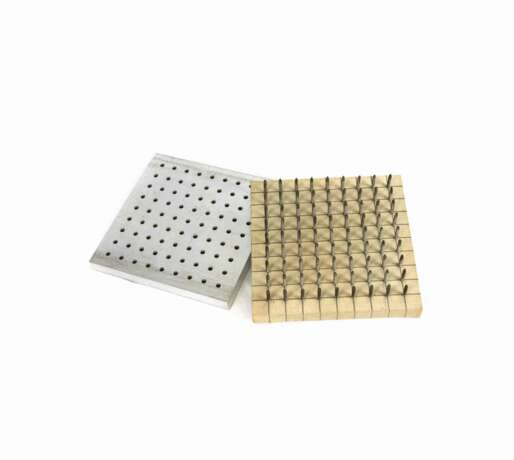ID 417689
Lot 106 | Nagelobjekt Positiv-Negativ
Estimate value
€ 8 500
Nagelobjekt Positiv-Negativ, 1974, 2-teiliges Multiple, leinwandbespannte Holzplatte mit Nägeln und Graphitrasterzeichnung sowie Metallplatte mit Bohrlöchern, 20 cm x 20 cm x 4,5 cm sowie 20 cm x 20 cm x 2 cm, signiert, 25/35 nummeriert, leichte Altersspuren, Originalkarton absent, Edition Kunst- und Museumsverein Wuppertal; Günther Uecker erlebte auf der Halbinsel Wustrow das Ende des 2. Weltkriegs. Nach der Schulzeit machte Uecker eine Lehre als Anstreicher und Schreiner. Danach studierte er bis 1953 Malerei, zuerst in Wismar, dann an der Kunstakademie in Berlin-Weißensee. 1951 kam er, bei einem Besuch in Westdeutschland, erstmals in Kontakt mit abstrakter Kunst. 1953 verließ er die DDR und siedelte nach Westberlin über. Dort beschäftigte er sich mit Religion und Philosophie, was sein Werk stark beeinflusste. Günther Uecker studierte von 1955 bis 1957 an der Kunstakademie Düsseldorf bei Otto Pankok. Es entstanden erstmals die für ihn typischen Nagelbilder. Ab 1962 versah Uecker Alltagsgegenstände wie Möbel mit Nagelreliefs. 1961 wurde Uecker Mitglied in der von Heinz Mack und Otto Piene gegründeten Künstlergruppe ZERO, woraufhin er sich auch der kinetischen Lichtkunst zuwandte. Gemeinsam mit Gerhard Richter inszenierte er die Demonstration \Museen können bewohnbare Orte sein\". 1970 war Uecker zusammen mit Thomas Lenk, Heinz Mack und Georg Karl deutscher Vertreter auf der Biennale von Venedig. Seit den 1980er Jahren nimmt er in seinen Werken zu politischen Fragen Stellung. So z.B. reagiert er mit seinen Aschebildern auf die Katastrophe von Tschernobyl. Von 1974 bis 1995 unterrichtete Uecker als Professor an der Kunstakademie in Düsseldorf. Im Dezember 2008 war Uecker Mitbegründer der Stiftung Zero foundation. Kinetische Kunst, Zero"""
| Auction house category: | Sculptures and Bronzes |
|---|
| Auction house category: | Sculptures and Bronzes |
|---|
| Address of auction |
WETTMANN | Auktionshaus an der Ruhr Friedrichstraße 67-67a 45468 Mülheim an der Ruhr Germany | ||||||||||||||
|---|---|---|---|---|---|---|---|---|---|---|---|---|---|---|---|
| Preview |
| ||||||||||||||
| Phone | +49 (0)208 3059081 | ||||||||||||||
| Fax | +49 (0)208 4391735 | ||||||||||||||
| Buyer Premium | 30% | ||||||||||||||
| Conditions of purchase | Conditions of purchase | ||||||||||||||
| Business hours | Business hours
|






